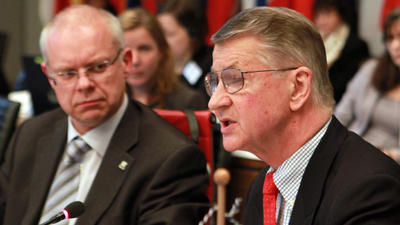-
Our work
-
Fields of work
- Arms control
- Border management
- Combating trafficking in human beings
- Conflict prevention and resolution
- Countering terrorism
- Cyber/ICT Security
- Democratization
- Economic activities
- Education
- Elections
- Environmental activities
- Gender equality
- Good governance
- Human rights
- Media freedom and development
- Migration
- National minority issues
- Policing
- Reform and co-operation in the security sector
- Roma and Sinti
- Rule of law
- Tolerance and non-discrimination
- Youth
- Field operations
- Projects
-
Meetings and conferences
- Summit meetings
- Review Conferences
- Ministerial Council meetings
- Plenary meetings of the Permanent Council
- Plenary Meetings of the Forum for Security Co-operation
- Security Review Conferences
- Annual Implementation Assessment Meetings
- Economic and Environmental Forum
- Economic and Environmental Dimension Implementation Meetings
- Human rights meetings
- Media conferences
- Cyber/ICT security conferences
- Conference of the Alliance against Trafficking in Persons
- Gender equality conferences
- Annual OSCE Mediterranean conferences
- Annual OSCE Asian conferences
- Partnerships
-
Fields of work
-
Countries
- All
-
Participating States
- Albania
- Andorra
- Armenia
- Austria
- Azerbaijan
- Belgium
- Belarus
- Bosnia and Herzegovina
- Bulgaria
- Canada
- Croatia
- Cyprus
- Czechia
- Denmark
- Estonia
- Finland
- France
- Georgia
- Germany
- Greece
- Holy See
- Hungary
- Iceland
- Ireland
- Italy
- Kazakhstan
- Kyrgyzstan
- Latvia
- Liechtenstein
- Lithuania
- Luxembourg
- Malta
- Moldova
- Monaco
- Mongolia
- Montenegro
- The Netherlands
- North Macedonia
- Norway
- Poland
- Portugal
- Romania
- Russian Federation
- San Marino
- Serbia
- Slovakia
- Slovenia
- Spain
- Sweden
- Switzerland – OSCE Chairpersonship 2026
- Tajikistan
- Türkiye
- Turkmenistan
- Ukraine
- United Kingdom
- United States of America
- Uzbekistan
- Asian Partners for Co-operation
- Mediterranean Partners for Co-operation
-
Structures and institutions
- Chairpersonship
-
Secretariat
- Secretary General
- Office of the Secretary General
- Conflict Prevention Centre
- Transnational Threats Department
- Office of the Special Representative and Co-ordinator for Combating Trafficking in Human Beings
- Office of the Co-ordinator of OSCE Economic and Environmental Activities
- Gender Issues Programme
- Opportunities for Youth
- Department of Human Resources
- Department of Management and Finance
- Office of Internal Oversight
- Documentation Centre in Prague
- Institutions
-
Field operations
- Presence in Albania
- Centre in Ashgabat
- Programme Office in Astana
- Programme Office in Bishkek
- Mission to Bosnia and Herzegovina
- Programme Office in Dushanbe
- Mission in Kosovo
- Mission to Moldova
- Mission to Montenegro
- Mission to Serbia
- Mission to Skopje
- Project Co-ordinator in Uzbekistan
- Closed field activities
- Parliamentary Assembly
- Court of Conciliation and Arbitration
- Organizational structure
- About us
Press release
National human rights institutions need clear mandate, resources and independence, speakers at OSCE meeting say

- Date:
- Source:
- OSCE Chairpersonship, OSCE Office for Democratic Institutions and Human Rights
- Fields of work:
- Democratization, Human rights
VIENNA, 14 April 2011 – National human rights institutions need a clear mandate, sufficient resources and genuine independence from governments to be able to play their role effectively, participants said today at the opening of a special OSCE meeting on the topic in Vienna.
The two-day meeting, organized by the OSCE’s Lithuanian Chairmanship and the OSCE Office for Democratic Institutions and Human Rights (ODIHR), brought together members of national human rights institutions and representatives of governments and civil society from the Organization’s 56 participating States and Partners for Co-operation.
Lithuanian Ambassador Renatas Norkus, the Chairperson of the OSCE Permanent Council, said that promoting and strengthening national human rights institutions was one of the Lithuanian Chairmanship’s priorities: “Such institutions can play a key role in introducing human rights issues to national policy agendas, in keeping them on those agendas, and in supporting governments in adhering to international human rights standards.”
Ambassador Janez Lenarčič, Director of ODIHR, stressed that national human rights institutions should act as a bridge between civil society and governments, rather than being “just another tool in the hands of governments to conceal or disregard human rights violations”.
“National human rights organizations often report to us that they have insufficient human and financial resources to do their work, and that their advice, guidance and recommendations are at times not followed or even ignored. We also often hear that their independence is put in question,” he said.
Keynote speaker Brian Burdekin, a former Federal Human Rights Commissioner in Australia and a long-standing expert on the matter, also emphasized the importance of ensuring the genuine independence of national human rights institutions. He said that the institutions’ independence must be prescribed in the law setting up the institution and demonstrated in the integrity of the institution’s members, the government’s respect for the institution’s independent role and the availability of sufficient resources.
Burdekin also said that national human rights institutions often have broad responsibilities without being given the resources and powers necessary to fulfill their mandates. He stressed the importance of national human rights institutions working closely with civil society: “This is the only way a broad-based national institution can function effectively. Civil society is our eyes and ears out there.”